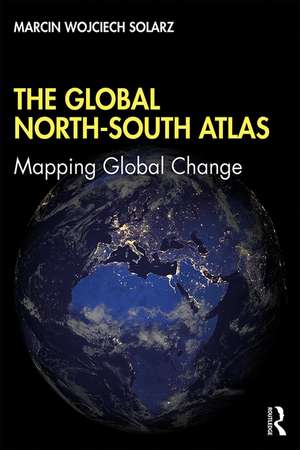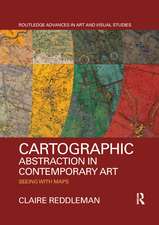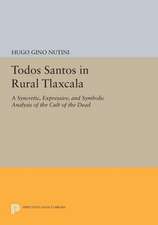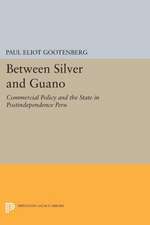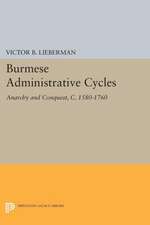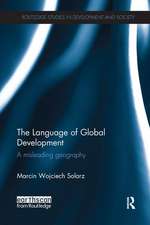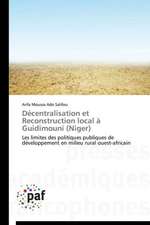The Global North-South Atlas: Mapping Global Change
Autor Marcin Wojciech Solarzen Limba Engleză Paperback – 5 noi 2019
Throughout the book a range of colorful maps and charts graphically demonstrate the ways in which the world has changed over the last 2,000 years. The atlas first analyzes the genesis and characteristics of the Brandt Line’s North–South divide, before going on to discuss its validity through the centuries, especially before and after 1980, and demonstrating the many definitions and philosophies of development that exist or may exist, which make it difficult to define a single notion of a Global North and South. The book concludes by proposing new schemes of categorization between developed and developing countries which might better fit our contemporary global society.
This book will serve as a perfect textbook for students studying global divisions within geography, politics, economics, international relations, and development departments, as well as being a useful guide for researchers, and for those working in NGOs and government institutions.
| Toate formatele și edițiile | Preț | Express |
|---|---|---|
| Paperback (1) | 126.15 lei 22-36 zile | +24.19 lei 5-11 zile |
| Taylor & Francis – 5 noi 2019 | 126.15 lei 22-36 zile | +24.19 lei 5-11 zile |
| Hardback (1) | 767.47 lei 43-57 zile | |
| Taylor & Francis – 5 noi 2019 | 767.47 lei 43-57 zile |
Preț: 126.15 lei
Nou
Puncte Express: 189
Preț estimativ în valută:
24.14€ • 25.27$ • 19.97£
24.14€ • 25.27$ • 19.97£
Carte disponibilă
Livrare economică 17-31 martie
Livrare express 28 februarie-06 martie pentru 34.18 lei
Preluare comenzi: 021 569.72.76
Specificații
ISBN-13: 9781138588844
ISBN-10: 1138588849
Pagini: 180
Ilustrații: 147 Line drawings, color; 147 Illustrations, color
Dimensiuni: 174 x 246 x 9 mm
Greutate: 0.43 kg
Ediția:1
Editura: Taylor & Francis
Colecția Routledge
Locul publicării:Oxford, United Kingdom
ISBN-10: 1138588849
Pagini: 180
Ilustrații: 147 Line drawings, color; 147 Illustrations, color
Dimensiuni: 174 x 246 x 9 mm
Greutate: 0.43 kg
Ediția:1
Editura: Taylor & Francis
Colecția Routledge
Locul publicării:Oxford, United Kingdom
Public țintă
Postgraduate, Professional, and UndergraduateCuprins
Introduction: The Brandt Line: political or developmental boundary; 1 Mapping global change: differences in development and wealth from the 1st to the 21st century; 2 Different philosophies of development: different development boundary lines; 3 Towards a new global line?; 4 Conclusions; Bibliography; Index
Notă biografică
Marcin Wojciech Solarz is Professor in the Faculty of Geography and Regional Studies at the University of Warsaw, Poland.
Recenzii
Excerpt from book review in Hungarian Geographical Bulletin, Vol. 69 No.1, 2020
"This book…contextualises and modulates the problem of what humanity thinks of development, progression, and well-being…The Brandt Line has a place in political and economic history rather than contemporary 21st-century atlases. Solarz’s work explores the geographic aspects of development in great detail, focusing on the discourse around the Brandt Line. By contributing to the discussion, he resolves the opposition of the global South and North with multiple approaches and offers new alternatives for presenting development on a global scale." -- Géza Barta, Doctorate School of Earth Sciences, Eötvös Loránd, University (ELTE), Budapest, Hungary
"This book…contextualises and modulates the problem of what humanity thinks of development, progression, and well-being…The Brandt Line has a place in political and economic history rather than contemporary 21st-century atlases. Solarz’s work explores the geographic aspects of development in great detail, focusing on the discourse around the Brandt Line. By contributing to the discussion, he resolves the opposition of the global South and North with multiple approaches and offers new alternatives for presenting development on a global scale." -- Géza Barta, Doctorate School of Earth Sciences, Eötvös Loránd, University (ELTE), Budapest, Hungary
Descriere
This innovative atlas uses a range of colourful maps, charts, and regional profiles to argue that the international community needs to think beyond the established 'North-South Line'. It is a perfect resource for geography, politics, economics, and development students studying global divisions.
